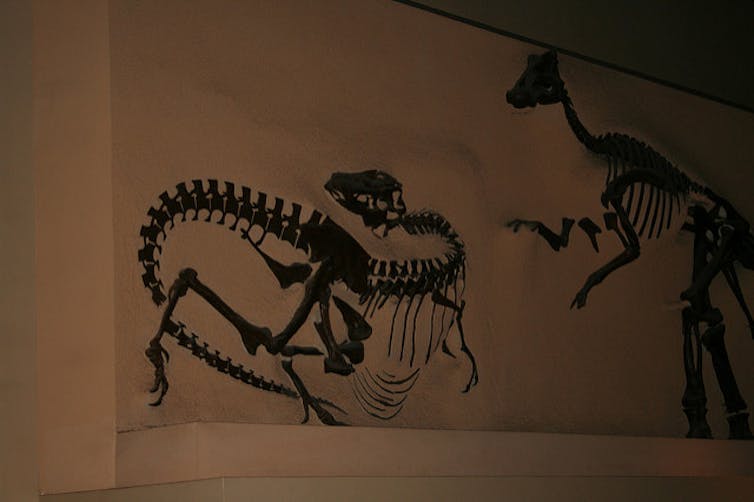Curious Kids: How do scientists work out how old the Earth is?
- Written by Alan Collins, Professor of Geology, University of Adelaide
 It turns out that the world is about 4,600,000,000 years old. That's 4.6 billion years. That's pretty old!Marcella Cheng/The Conversation, CC BY-NC-ND
It turns out that the world is about 4,600,000,000 years old. That's 4.6 billion years. That's pretty old!Marcella Cheng/The Conversation, CC BY-NC-NDThis is an article from Curious Kids, a series for children. The Conversation is asking kids to send in questions they’d like an expert to answer. All questions are welcome – serious, weird or wacky!
How do scientists work out how old the Earth is? Leo, age 5, Geelong West.
Well, Leo, the world is actually like a big clock. We just need to know how to read the clock. To do that, we have to think about what the world is made of.
The world, and everything in it, is actually made of something very small called “elements”. These are the tiny, tiny building blocks of everything. You might have heard the names of some elements before. Gold is an element, and so is silver. There are lots of other elements too, with strange names like krypton and selenium and plutonium. There are about 118 different elements on Earth that we know about so far.
Read more: Explainer: what is radiocarbon dating and how does it work?
Most of these elements don’t change and stay the way they are forever. Scientists call these ones “stable” elements.
But there is a second sort of element that actually changes into something else over time. These aren’t as common, but they are in everything. They’re called “unstable” or “radioactive” elements.
Imagine that - some part of you is actually changing into something else! But don’t worry, most of these change over a very, very long time. Some take billions of years to do any really serious changing.
Your teeth have an element called potassium that is one of these changing elements. Your TV, computer, the soil in your garden – everything, really – has some of these changing elements. The changing process is called “radioactive decay”.
As you might have guessed, rocks also have these unstable elements in them. And we’ve measured out how long it takes for one of these elements to change into another one.
For example, if we had some stuff that contained an unstable element called 14C (to say out loud, this is “carbon 14”), we know it takes about 5,730 years for about half of all the 14C in our sample to change into another element called 14N (pronounced as “nitrogen 14”).
Knowing how fast these elements change from one thing into another thing gives us a very big clue about how old the Earth is.
 Scientists using the same techniques to work out how old fossils are.Flickr/Scott, CC BY
Scientists using the same techniques to work out how old fossils are.Flickr/Scott, CC BYRead more: Curious Kids: Do bees ever accidentally sting other bees?
So how do we measure how old the Earth is?
Well, first we measure how much of the unstable elements are still left in the rocks of the Earth - these are the elements that haven’t changed yet, but will change over time because we know they’re unstable.
Then we measure the amount of the element they change into.
Once we know this, and we know how long the change takes, we can work out how old the world is!
It turns out that the world is about 4,600,000,000 years old. That’s 4.6 billion years. That’s pretty old!
Hello, curious kids! Have you got a question you’d like an expert to answer? Ask an adult to send your question to us. You can:
* Email your question to curiouskids@theconversation.edu.au * Tell us on Twitter by tagging @ConversationEDU with the hashtag #curiouskids, or * Tell us on Facebook
 CC BY-ND
CC BY-NDPlease tell us your name, age and which city you live in. You can send an audio recording of your question too, if you want. Send as many questions as you like! We won’t be able to answer every question but we will do our best.
Alan Collins receives funding from the Australian Research Council
Authors: Alan Collins, Professor of Geology, University of Adelaide
Read more http://theconversation.com/curious-kids-how-do-scientists-work-out-how-old-the-earth-is-90391


















